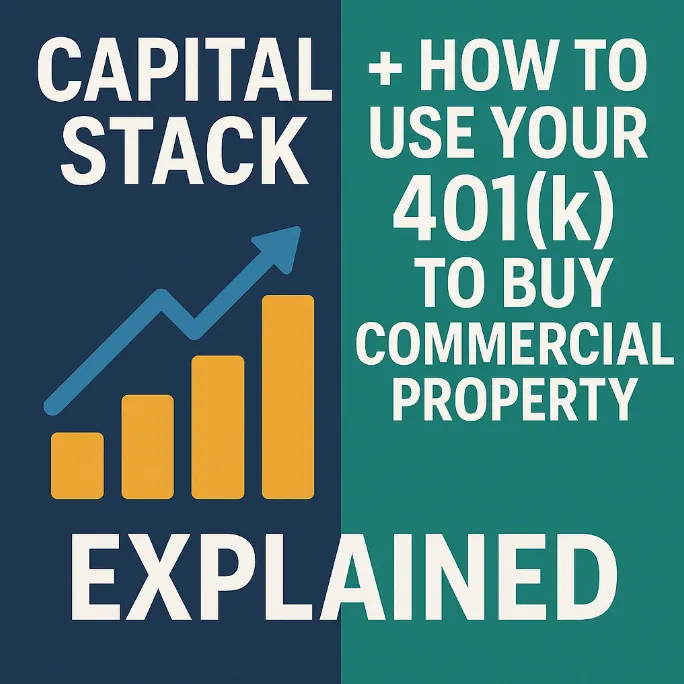
💼 Capital Stack Explained: How Debt & Equity Power CRE Deals 📊
💼 Capital Stack Explained: How Debt & Equity Power CRE Deals 📊
💡 Can You Use Your 401(k) to Buy Commercial Real Estate? Here’s What Investors Should Know 🏢
✍️ 2. SEO-Optimized Blog Post
💡 Understanding the Capital Stack (Debt vs Equity) & Can I Use My 401(k) to Buy CRE?
In commercial real estate (CRE), success is often built on strategy—especially when it comes to how you finance your investment. Two common questions among new and seasoned investors alike are:
1. What is the capital stack and how does it work?
2. Can I use retirement funds like a 401(k) to invest in commercial properties?
This post will break down both, giving you a clearer path to smarter investing.
🏗️ What Is the Capital Stack?
The capital stack refers to the layers of financing used to fund a commercial real estate project. Think of it as a pyramid with four main components:
1. Senior Debt – The primary loan (usually from a bank or lender). It has the lowest risk and lowest return and is the first to be paid in the event of a sale or refinance.
2. Mezzanine Debt – A riskier, higher-yield loan sitting behind senior debt.
3. Preferred Equity – Investors with fixed returns who get paid before common equity holders.
4. Common Equity – The riskiest position, often held by the sponsor or general partners, but with the highest potential return.
Understanding where your money sits in the capital stack can help you measure risk and expected return.
💰 Using Your 401(k) to Invest in Commercial Real Estate
Yes, it is possible to use retirement funds like a 401(k) or IRA to invest in commercial real estate—but there are rules.
Here’s how:
· You’ll need a self-directed IRA (SDIRA) or a Solo 401(k) to gain control over investment choices.
· The SDIRA custodian allows you to direct funds into CRE, including syndicated deals, partnerships, or direct ownership.
· You cannot personally benefit (i.e., no self-dealing). That means you can’t live in or lease space in the property you buy with retirement funds.
Pros:
✅ Tax-deferred or tax-free growth
✅ Portfolio diversification
✅ Access to high-yield real estate returns
Cons:
⚠️ Complex compliance rules
⚠️ No personal usage of the property
⚠️ Must use a qualified custodian
💡 Final Thoughts
Whether you're evaluating risk via the capital stack or unlocking hidden capital in your 401(k), understanding how money flows in CRE deals is key to smarter investing.
If you’re considering investing in commercial property and want to explore financing or retirement account strategies, our team at Houston Real Estate Brokerage is here to help.
👉 Book a call today or download our free CRE Investment Roadmap below.
https://www.houstonrealestatebrokerage.com/
https://www.houstonrealestatebrokerage.com/houston-cre-navigator
https://www.commercialexchange.com/agent/653bf5593e3a3e1dcec275a6
http://expressoffers.com/[email protected]
https://app.bullpenre.com/profile/1742476177701x437444415125976000
https://author.billrapponline.com/
https://www.amazon.com/dp/B0F32Z5BH2
© 2023-2024 Bill Rapp, Broker Associate, eXp Commercial Viking Enterprise Team
